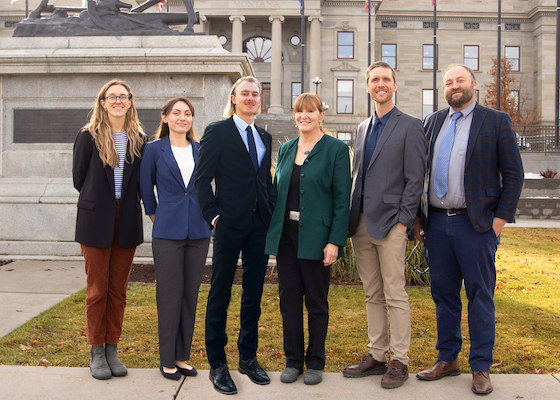by Anne Hedges

MEIC’s 2025 Lobbying Team from left to right: Shannon James, Laura Collins, Nick Fitzmaurice, Anne Hedges, Ben Catton, and Derf Johnson.
Each session, MEIC’s staff works harder and harder to keep up with the ever-increasing flurry of drafted and introduced bills. We help pass good bills, as well as amend and clarify bills that are well-intentioned but poorly-worded or have unintended consequences. We also work to defeat proposals that would upend our constitutional rights, undermine public health, veil government decisions in secrecy, or benefit polluting corporations at the expense of everyday Montanans and the land, air and water on which life depends.
But what you might not know is how many bills that MEIC works to have introduced. Two of MEIC’s proposals passed and are described in more detail earlier in this newsletter (a resolution supporting transmission and a resolution asking for a study of wildfire insurance issues). Both of these bills had strong bipartisan support.
But even when they don’t pass, we find this process to be an important means for education on our priority issues. For example, MEIC worked with Rep. Katie Sullivan (D-Missoula), Public Service Commissioner Annie Bukacek and a number of MEIC supporters to introduce a bill to require a smidgeon of transparency regarding data center energy use. Although it ultimately failed, it became a catalyst for the letter the PSC sent to NorthWestern Energy regarding its proposed data center load (see article on pg. 23).
We worked with Rep. George Nikolakakos (R-Great Falls) to introduce a resolution supporting renewable energy. Although the resolution did not pass, it created an opportunity to educate the House Energy & Telecommunications Committee of the benefits of renewable energy in Montana. HJ 8 (Rep. Becky Edwards, D-Bozeman), a study resolution on addressing the unfair tax and fee system for EV’s compared to fossil fuel powered vehicles, provided a similar opportunity.
No session is complete without discussing the opencut permitting process. A 2021 amendment to the law eliminated protection of water and air resources, limits on operating hours, lighting restrictions, and public participation requirements. Sens. Pat Flowers (D-Belgrade) and Shane Morigeau (D-Missoula) brought bills to correct some of the most egregious harm. People from across the state provided outstanding testimony on the harmful impacts of the current permitting and appeal system, but the Senate rejected these bills after hearing self-serving mistruths from the developers.
That led MEIC to introduce another bill thanks to Sen. Janet Ellis (D-Helena) to allow any party challenging an environmental permit to go to district court instead of going to the Board of Environmental Review (BER). The BER is dysfunctional. It rarely meets, often cancels meetings, contains few attorneys, and can take over nine years to rule on a permit appeal. As one opponent admitted, it works as intended. It delays resolution of cases until long after the project is built and operating. While the bill was defeated, legislators and Department of Environmental Quality admitted the problem needs to be addressed.
MEIC worked on many bills to increase the public’s right to know and helped Rep. Ed Staffman (D-Bozeman) to introduce HB 271. While the Legislature approved the bill to limit the Governor’s ability to keep information from the public, unfortunately the Governor vetoed the bill.
MEIC works not only to prevent harmful legislation from passing, but also to try and improve the law and legislators’ understanding of important issues. MEIC staff do this with joy, laughter, frustration, anger, and strategy. I couldn’t be prouder to work with a team of talented individuals who care so much and work so hard to improve the world in which we live. For them and for you, our members who support us every step of the way, I am grateful.
This article was published in the June 2025 issue of Down To Earth.

